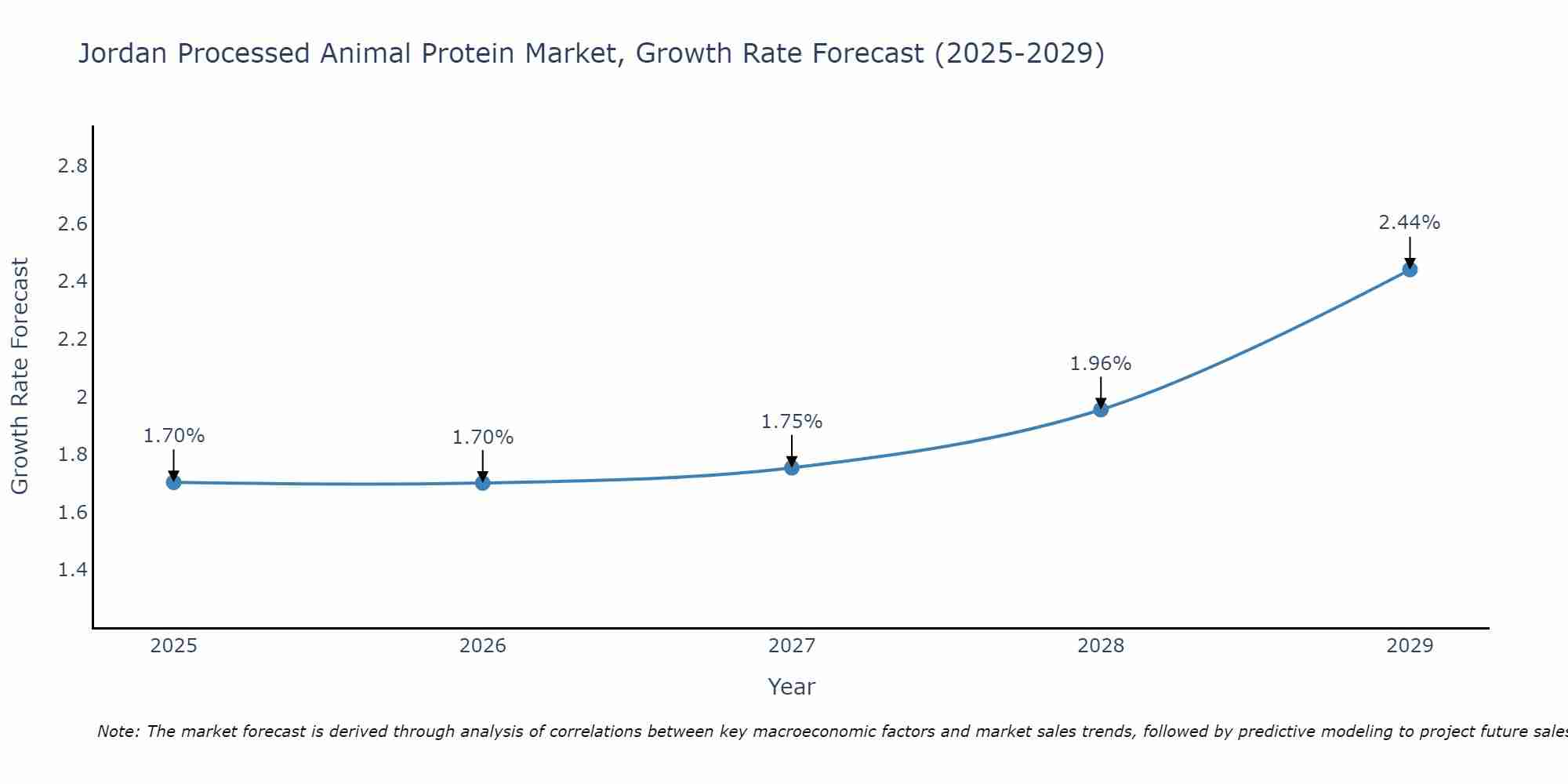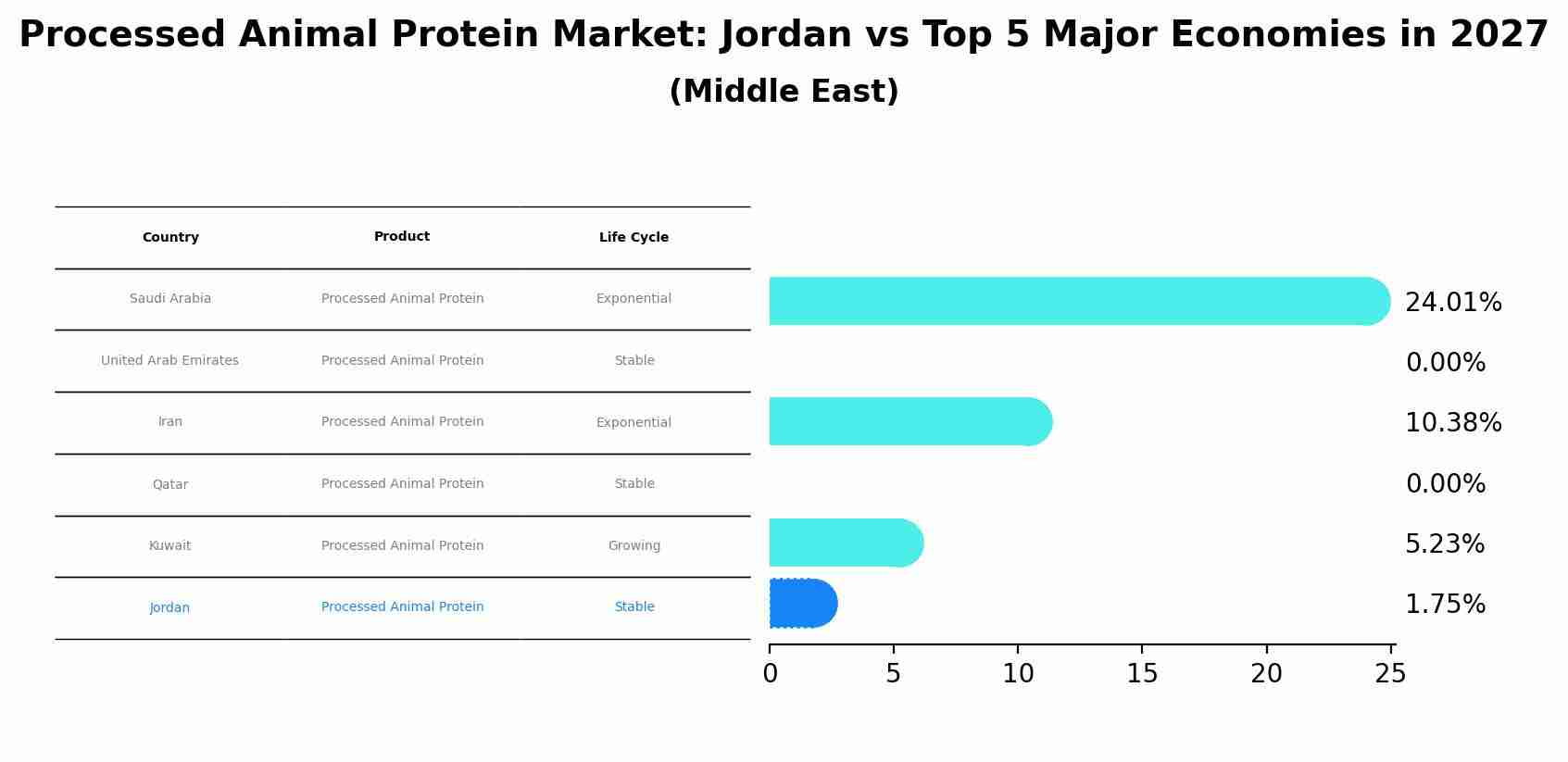Jordan Processed Animal Protein Market (2025-2031) Outlook | Share, Trends, Analysis, Size, Value, Companies, Forecast, Revenue, Industry & Growth
| Product Code: ETC411942 | Publication Date: Oct 2022 | Updated Date: Jul 2025 | Product Type: Market Research Report | |
| Publisher: 6Wresearch | Author: Dhaval Chaurasia | No. of Pages: 75 | No. of Figures: 35 | No. of Tables: 20 |
Jordan Processed Animal Protein Market Size Growth Rate
The Jordan Processed Animal Protein Market is projected to witness mixed growth rate patterns during 2025 to 2029. The growth rate starts at 1.70% in 2025 and reaches 2.44% by 2029.

Processed Animal Protein Market: Jordan vs Top 5 Major Economies in 2027 (Middle East)
By 2027, Jordan's Processed Animal Protein market is forecasted to achieve a stable growth rate of 1.75%, with Saudi Arabia leading the Middle East region, followed by United Arab Emirates, Iran, Qatar and Kuwait.

Jordan Processed Animal Protein Market Synopsis
The Jordan processed animal protein market is witnessing steady growth driven by increasing demand for protein-rich food products. Key players in the market include companies involved in the production and distribution of processed meat, poultry, and fish products. The market is characterized by a growing preference for convenience foods, leading to a rise in the consumption of processed animal protein products such as sausages, burgers, and canned meats. Additionally, changing consumer lifestyles and dietary habits are further fueling the market growth. Government initiatives promoting food security and investments in the food processing industry are also contributing to the expansion of the processed animal protein market in Jordan. Overall, the market is expected to continue its positive trajectory in the coming years, presenting opportunities for both domestic and international players.
Jordan Processed Animal Protein Market Trends
The Jordan processed animal protein market is currently experiencing a shift towards healthier and more sustainable options, driven by increasing consumer awareness of health and environmental concerns. There is a growing demand for organic and natural animal protein products, as well as alternatives such as plant-based proteins. Consumers are also seeking transparency in sourcing and production methods. Additionally, convenience and on-the-go options are gaining popularity, leading to an increase in ready-to-eat and snackable protein products. With a focus on quality, nutrition, and ethical practices, companies in the Jordan processed animal protein market are innovating to meet these evolving consumer preferences and stay competitive in the market.
Jordan Processed Animal Protein Market Challenges
In the Jordan processed animal protein market, one of the key challenges faced is the fluctuation in raw material prices, which directly impacts production costs and ultimately profit margins for manufacturers. Additionally, there is a growing concern among consumers regarding the quality and safety of processed animal protein products, leading to increased scrutiny and regulations by government authorities. Competition from imported products also poses a challenge for local producers, as foreign brands often have established reputations and economies of scale. Furthermore, with changing consumer preferences towards healthier and more sustainable options, there is a need for innovation and adaptation within the market to meet these evolving demands. Overall, navigating these challenges requires strategic planning, market research, and investment in technology and quality control measures.
Jordan Processed Animal Protein Market Investment Opportunities
Investment opportunities in the Jordan processed animal protein market are promising due to factors such as increasing consumer demand for convenient and value-added meat products, a growing population with rising disposable incomes, and a shift towards Westernized dietary preferences. Potential investment options include establishing or expanding processing facilities for products like processed meat, poultry, and seafood, investing in innovative technologies for food safety and quality control, and developing distribution channels to reach a wider market. Additionally, there is potential for investment in sustainable and organic processed animal protein products to cater to the growing trend of health and environmentally conscious consumers. Overall, the Jordan processed animal protein market presents opportunities for investors looking to capitalize on the evolving food industry landscape in the region.
Jordan Agar Market Government Policies
The Jordanian government has implemented various policies to regulate the Processed Animal Protein Market in the country. These policies focus on ensuring the safety and quality of animal products through strict monitoring and inspection mechanisms. Additionally, regulations are in place to control the import and export of processed animal protein to safeguard public health and prevent the spread of diseases. The government also promotes transparency in labeling and packaging practices to provide consumers with accurate information about the products they are purchasing. Overall, these policies aim to promote a competitive and sustainable processed animal protein market in Jordan while prioritizing consumer protection and animal welfare.
Jordan Processed Animal Protein Market Future Outlook
The future outlook for the Jordan Processed Animal Protein Market appears positive, driven by factors such as increasing consumer demand for high-quality protein products, rising disposable incomes, and a growing focus on healthy eating habits. The market is expected to witness steady growth due to a rising population, urbanization, and changing dietary preferences towards protein-rich foods. Additionally, technological advancements in food processing and packaging are likely to further boost market growth by enhancing product quality and shelf life. With a growing awareness of the benefits of animal protein consumption and an expanding food industry in Jordan, the processed animal protein market is poised for expansion and innovation in the coming years.
Key Highlights of the Report:
- Jordan Processed Animal Protein Market Outlook
- Market Size of Jordan Processed Animal Protein Market, 2024
- Forecast of Jordan Processed Animal Protein Market, 2031
- Historical Data and Forecast of Jordan Processed Animal Protein Revenues & Volume for the Period 2021 - 2031
- Jordan Processed Animal Protein Market Trend Evolution
- Jordan Processed Animal Protein Market Drivers and Challenges
- Jordan Processed Animal Protein Price Trends
- Jordan Processed Animal Protein Porter's Five Forces
- Jordan Processed Animal Protein Industry Life Cycle
- Historical Data and Forecast of Jordan Processed Animal Protein Market Revenues & Volume By Source for the Period 2021 - 2031
- Historical Data and Forecast of Jordan Processed Animal Protein Market Revenues & Volume By Poultry for the Period 2021 - 2031
- Historical Data and Forecast of Jordan Processed Animal Protein Market Revenues & Volume By Pork for the Period 2021 - 2031
- Historical Data and Forecast of Jordan Processed Animal Protein Market Revenues & Volume By Beef for the Period 2021 - 2031
- Historical Data and Forecast of Jordan Processed Animal Protein Market Revenues & Volume By Others for the Period 2021 - 2031
- Historical Data and Forecast of Jordan Processed Animal Protein Market Revenues & Volume By Form for the Period 2021 - 2031
- Historical Data and Forecast of Jordan Processed Animal Protein Market Revenues & Volume By Dry for the Period 2021 - 2031
- Historical Data and Forecast of Jordan Processed Animal Protein Market Revenues & Volume By Liquid for the Period 2021 - 2031
- Jordan Processed Animal Protein Import Export Trade Statistics
- Market Opportunity Assessment By Source
- Market Opportunity Assessment By Form
- Jordan Processed Animal Protein Top Companies Market Share
- Jordan Processed Animal Protein Competitive Benchmarking By Technical and Operational Parameters
- Jordan Processed Animal Protein Company Profiles
- Jordan Processed Animal Protein Key Strategic Recommendations
Frequently Asked Questions About the Market Study (FAQs):
- Single User License$ 1,995
- Department License$ 2,400
- Site License$ 3,120
- Global License$ 3,795
Search
Related Reports
- Vietnam System Integrator Market (2025-2031) | Size, Companies, Analysis, Industry, Value, Forecast, Growth, Trends, Revenue & Share
- ASEAN and Thailand Brain Health Supplements Market (2025-2031) | Strategy, Consumer Insights, Analysis, Investment Trends, Opportunities, Growth, Size, Share, Industry, Revenue, Segments, Value, Segmentation, Supply, Forecast, Restraints, Outlook, Competition, Drivers, Trends, Demand, Pricing Analysis, Competitive, Strategic Insights, Companies, Challenges
- ASEAN Bearings Market (2025-2031) | Strategy, Consumer Insights, Analysis, Investment Trends, Opportunities, Growth, Size, Share, Industry, Revenue, Segments, Value, Segmentation, Supply, Forecast, Restraints, Outlook, Competition, Drivers, Trends, Demand, Pricing Analysis, Competitive, Strategic Insights, Companies, Challenges
- Europe Flooring Market (2025-2031) | Outlook, Share, Industry, Trends, Forecast, Companies, Revenue, Size, Analysis, Growth & Value
- Saudi Arabia Manlift Market (2025-2031) | Outlook, Size, Growth, Trends, Companies, Industry, Revenue, Value, Share, Forecast & Analysis
- Uganda Excavator, Crane, and Wheel Loaders Market (2025-2031) | Strategy, Consumer Insights, Analysis, Investment Trends, Opportunities, Growth, Size, Share, Industry, Revenue, Segments, Value, Segmentation, Supply, Forecast, Restraints, Outlook, Competition, Drivers, Trends, Demand, Pricing Analysis, Competitive, Strategic Insights, Companies, Challenges
- Rwanda Excavator, Crane, and Wheel Loaders Market (2025-2031) | Strategy, Consumer Insights, Analysis, Investment Trends, Opportunities, Growth, Size, Share, Industry, Revenue, Segments, Value, Segmentation, Supply, Forecast, Restraints, Outlook, Competition, Drivers, Trends, Demand, Pricing Analysis, Competitive, Strategic Insights, Companies, Challenges
- Kenya Excavator, Crane, and Wheel Loaders Market (2025-2031) | Strategy, Consumer Insights, Analysis, Investment Trends, Opportunities, Growth, Size, Share, Industry, Revenue, Segments, Value, Segmentation, Supply, Forecast, Restraints, Outlook, Competition, Drivers, Trends, Demand, Pricing Analysis, Competitive, Strategic Insights, Companies, Challenges
- Angola Excavator, Crane, and Wheel Loaders Market (2025-2031) | Strategy, Consumer Insights, Analysis, Investment Trends, Opportunities, Growth, Size, Share, Industry, Revenue, Segments, Value, Segmentation, Supply, Forecast, Restraints, Outlook, Competition, Drivers, Trends, Demand, Pricing Analysis, Competitive, Strategic Insights, Companies, Challenges
- Israel Intelligent Transport System Market (2025-2031) | Strategy, Consumer Insights, Analysis, Investment Trends, Opportunities, Growth, Size, Share, Industry, Revenue, Segments, Value, Segmentation, Supply, Forecast, Restraints, Outlook, Competition, Drivers, Trends, Demand, Pricing Analysis, Competitive, Strategic Insights, Companies, Challenges
Industry Events and Analyst Meet
Our Clients
Whitepaper
- Middle East & Africa Commercial Security Market Click here to view more.
- Middle East & Africa Fire Safety Systems & Equipment Market Click here to view more.
- GCC Drone Market Click here to view more.
- Middle East Lighting Fixture Market Click here to view more.
- GCC Physical & Perimeter Security Market Click here to view more.
6WResearch In News
- Doha a strategic location for EV manufacturing hub: IPA Qatar
- Demand for luxury TVs surging in the GCC, says Samsung
- Empowering Growth: The Thriving Journey of Bangladesh’s Cable Industry
- Demand for luxury TVs surging in the GCC, says Samsung
- Video call with a traditional healer? Once unthinkable, it’s now common in South Africa
- Intelligent Buildings To Smooth GCC’s Path To Net Zero













